Owning a fifth wheel camper allows you to enjoy the great outdoors in comfort. However, in order to move your new “home on wheels”, you will need to find the best truck for towing a fifth wheel. If you are like most shoppers, you have no idea what to look for in a fifth wheel tow truck.
You want to get the truck with the right towing setup for your needs. Etrailer says: “just because one truck type is up for anything doesn’t mean it’s one size fits all. Factors like daily driving comfort, cab size, and up-front costs are worth considering as well”. (1) So while finding the best truck for fifth wheel towing is more than just the weights and specs, we will focus on those here, and let you manage the rest of your wish list.
When towing a fifth wheel, unless it is very small, a midsize pickup will not do. So we are only dealing with full sized trucks here. Think Silverado, Ram and Ford F-150 and above. Toyota Tundra is finally coming into the fold with their trucks, but only at the lower end of the spectrum. The 2022 models do have a more powerful engine than last years and offer a 12000lb towing capacity. They do not make 3/4 or one ton trucks, nor do they offer a diesel option.
All of these trucks will come with impressive standard safety features, like traction control, blind spot monitoring, and parking sensors. Additionally, each new year seems to bring new fantastic features like rearview camera, better traction, and keyless entry. As a general rule, the newer the truck, the more features you can expect.
This article offers you the guidance needed on how to size a truck correctly for safe and effective fifth wheel towing. Then YOU can choose the truck with the additional features you want.
5th Wheel Weights You Need to Know
Before you can get started finding the best truck to pull a fifth wheel, there are 2 different weights that you need to know from your fifth wheel. For more information on the Average Camper Weight, click here.
- GVWR- The Gross Vehicle Weight Rating is the maximum that your RV is allowed to weigh when fully loaded. Do NOT be fooled by the UVW (Unloaded Vehicle Weight) which is stated often by manufacturers and sales lots. If you are looking at UVW, just add the CCC (Cargo Carrying Capacity) to get the GVWR.
- Hitch Weight: For every rv trailer, whether it be a 5’er or a travel trailer, most of the weight is born by the axels and wheels. However a small amount (15 – 20%) of the weight is carried by the hitch, and transferred to the tow vehicle. Also known as tongue weight.
We’ll get into this more in the next sections. It is critical that you do not pull a load that exceeds the ratings of your truck. Many people do. Just because you can get the load moving, doesn’t mean it is safe, and doesn’t mean you can stop it.
Towing Capacity vs Payload
Towing capacities and payloads for trucks are related but different. Towing capacity is all about how much weight your truck can PULL. It has to do more with the power of the powertrain than it does with the suspension. Payload is the amount of weight your truck can take in the bed- it has more to do with the suspension. This is especially important for fifth wheels. The two are very much related, but do not always go hand in hand. Check your truck’s owners manual for towing restrictions.
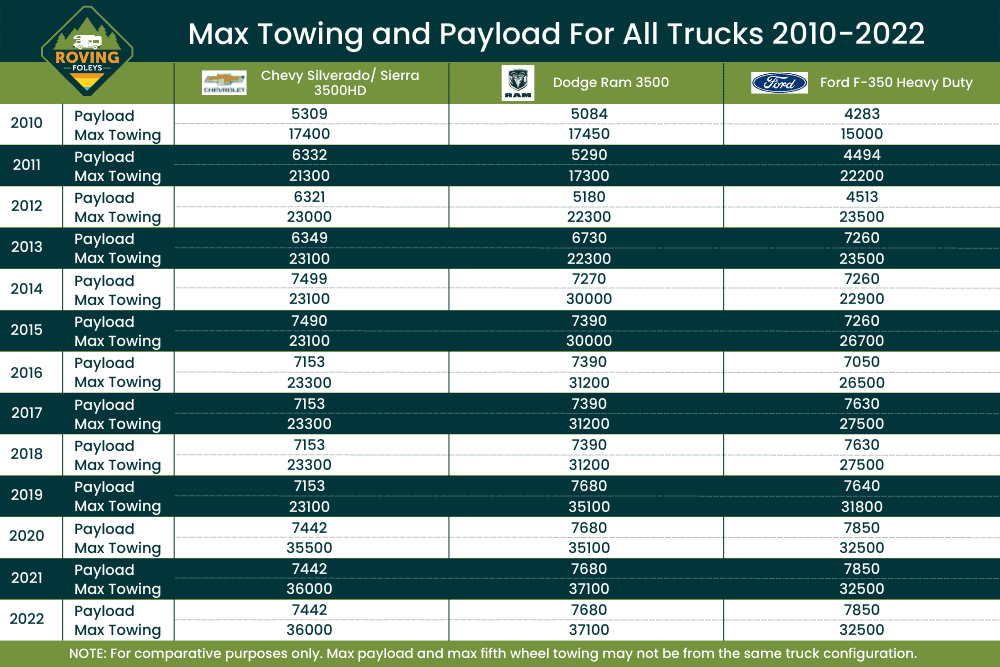
For instance, a truck that is built to have a massive towing capacity will have a large diesel engine and heavy frame. A diesel engine weighs more than a gas engine. This may lower the payload capacity. So a truck with high towing capabilities may have a lower payload number than a truck with less pulling power.
For towing lightweight fifth wheels, you may need a truck with higher payload capacity and lower pulling power. The idea is to check the numbers on your individual truck and make sure you have a fully capable towing machine for your needs.
Understanding GCWR and GVWR
Towing calculations require consideration of much more that just the trucks maximum towing capacity. GVWR, the Gross Vehicle Weight Rating, is the amount your truck weighs when it is completely loaded, including fuel, passengers, and cargo. This rating is the average of truck owners. The hitch weight of your trailer will be included in this number since that weight is transferred to the rear axle of your truck.
When you are researching trucks, you must determine two things.
1) How much weight your truck can handle towing.
Looking at the sticker on the truck, you will see the GCWR. GCWR is an abbreviation for a Gross Combined Weight Rating. The Gross Combined Weight Rating (GCWR) is the maximum weight of the loaded truck, its fuel, passengers, and cargo, and includes the GVWR of the fifth wheel, or the maximum fully loaded trailer weight.
2) The amount of weight the rear end can handle.
The axle, suspension AND wheels/tires all must be rated to handle the weight of the truck and the weight of passengers and cargo.
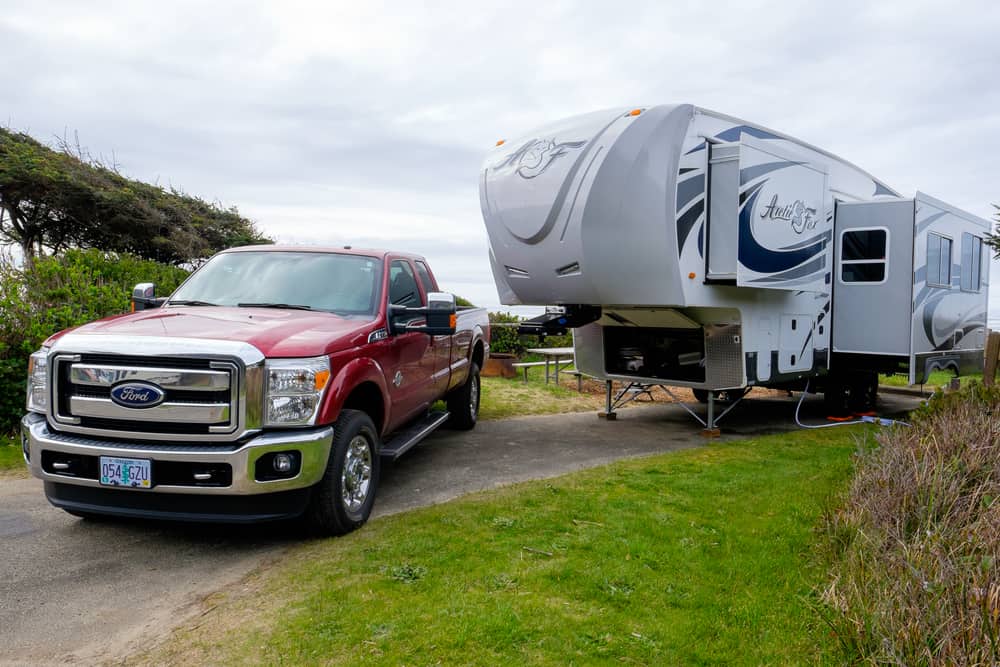
The rear must also be able to handle the additional fifth wheel tongue weight. There should be a sticker inside the drivers door of your truck telling you how much each axle can handle. It is possible for a truck to have the power to pull more weight than the rear suspension can handle so it is important to check these ratings.
This is especially important when buying a large fifth wheel trailer. It happened to us. When we bought our 5th wheel, our 2009 Chevrolet Silverado 2500HD needed to have an additional leaf spring added to the rear as well as heavier tires all around to handle the additional load.
It had a turbo diesel engine so there was plenty of pulling power for the rig, but the suspension was too light. (BTW We were NOT aware of this until AFTER we purchased the fifth wheel!!!)
Payload Capacity and Towing
When you are shopping for a truck, you will see that different trucks have different towing and payload capacities. Some trucks are rated with a payload capacity of half of a ton. Other trucks are rated with a payload capacity of three quarters of a ton. Finally, other trucks are rated with a payload capacity of one ton.
These labels are a dropback to days past, when they described the payload capacity of the trucks. Todays one ton trucks can handle payloads of nearly 4 times that amount. The payload capacity that is needed to tow a fifth wheel will depend on the weight of your loaded travel trailer.
As a rule of thumb, one half ton trucks are capable of towing fifth wheels that are under 30 feet long and weigh up to 10,000- 12000 pounds when loaded. They are great for a travel trailer or smaller fifth wheel.
A three quarter ton truck is capable of towing fifth wheels that are between 30 and 39 feet and weigh between 10,000 and 23000 pounds when the travel trailer is completely loaded. This will cover most fifth wheels.
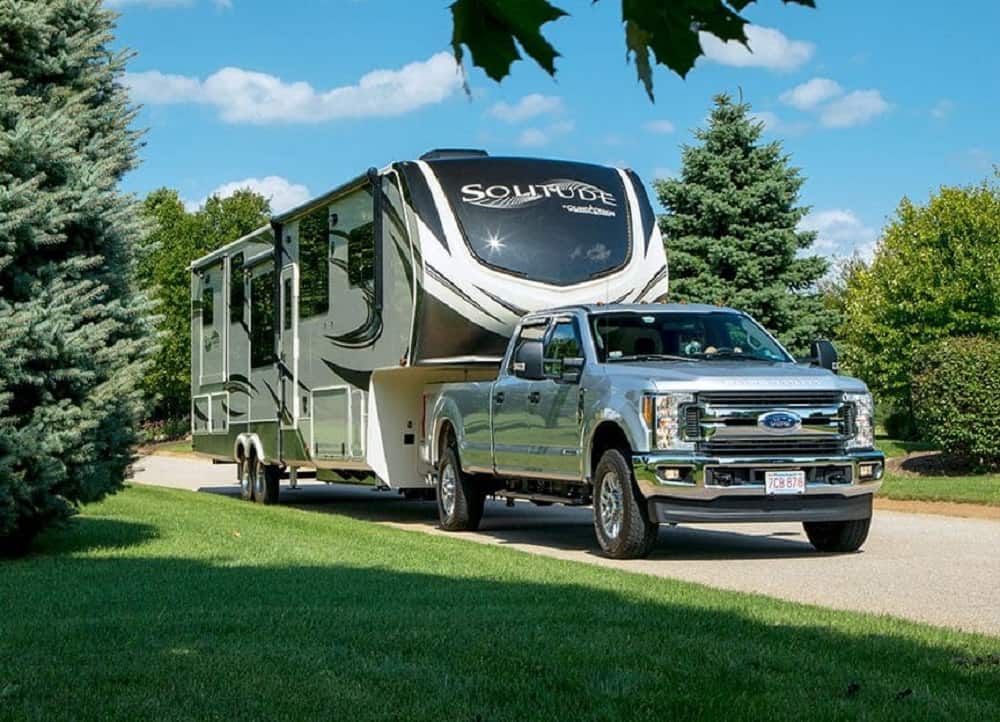
Finally, full ton trucks are capable of towing fifth wheels that are longer than 40 feet and weigh up to 36000 pounds.
(let the arguments begin)
Determining which truck is best for towing a fifth wheel can be difficult; however, with the information supplied above, you can make an informed decision.
First, opt for a diesel truck for better gas mileage, fewer repairs, and improved torque. If you will be towing a 5th wheel, you want a full sized long bed truck to prevent the trailer from jackknifing and hitting your truck. Finally, you should calculate the Gross Combined Weight Rating that is necessary to pull your fifth wheel, passengers, fuel, and supplies.
Then take your 5th wheel into account. Look at the overall of the fifth wheel RV compared to the towing capacity of the truck. Then look at the tongue weight of the camper compared to the rear end weight rating of the truck, and the tires. When considering the rating of the tires, divide the hitch weight in 2. (half the weight on each side of the truck.)
Once you have a good idea of what you need, consult your sales rep. According to Edmunds you should consider that each truck model is sold in a variety of cab, bed length, powertrain and axle-ratio configurations. We recommend consulting the manufacturers’ towing guides to make sure the truck you’re considering meets your needs.(2)
Long Bed Trucks vs. Short Bed Trucks
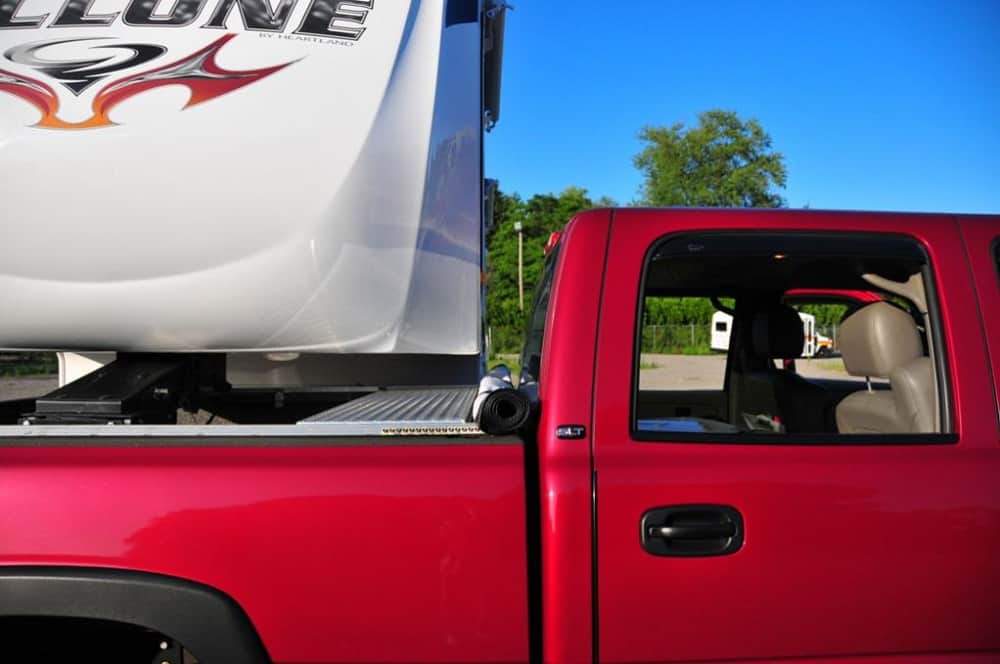
If you will be towing a fifth wheel, a long bed truck is preferred. Short bed trucks require specialized hitches because their turning radius is decreased. The hitch, and therefore the rig is closer to the cab, cutting down on turning radius, or “cab clearance.”
If the wrong hitch is used, you could accidentally cause the camper to hit the cab of the truck. Furthermore, a larger truck box will provide you with extra storage space for your camping supplies. A sliding hitch allows you to adjust the distance from the front of the truck to increase turning radius during parking.
A long bed truck is eight feet long and provides better traction, improved turning clearance, and reduced sway than a short bed truck. They will also be able to use a fixed hitch and have higher payload capacities. However, many drivers feel a long bed truck is too large to be used as a daily driver (we can definitely agree with that.)
Conversely, short bed trucks are under eight feet long. These trucks are much easier to maneuver and park when you are not towing a fifth wheel trailer. Short beds are great as a daily driver and can have just as large a large cab. However, short beds do not have as much traction and their turning clearance is reduced. Plus they have a lower payload capacity if you use the bed for storage. Many times these trucks will require manual sliding hitches to compensate for the short turning radius.
Gas vs. Diesel Engines
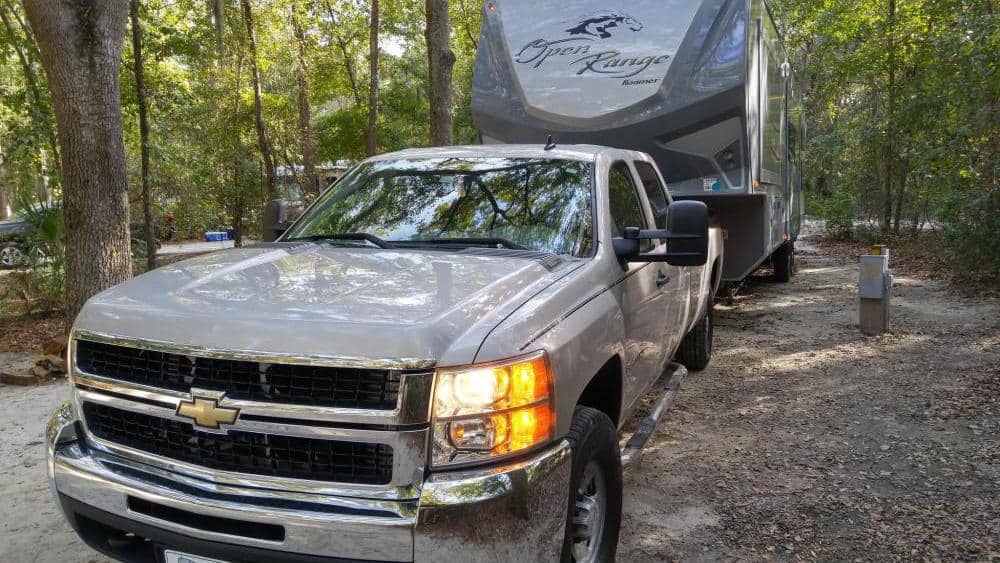
Although trucks with gas engines can pull a toy hauler or a fifth wheel, most die hard RVers prefer the diesel engine option. Diesel truck engines generally provide better fuel economy, especially when pulling larger 5th wheel campers.
In addition to this, a diesel engine will last much longer than a gasoline engine when it is used to tow a travel trailer. The additional power supplied by a diesel is very nice to have when towing in the mountains.
Gasoline powered fifth wheel towing trucks are cheaper to purchase, maintenance on the vehicle is more affordable than diesel trucks, and the cost of gas is less than the price of diesel. But with the mileage and power taken into consideration, many owners prefer a fifth wheel towing truck with the diesel engine option.
Do You Need a Dual Rear Wheels or Not?
When the 5th wheel requires a heavy duty truck, (three quarters or one ton truck) many people wonder if they need a dually to tow a fifth wheel, or can they use a single rear wheel truck? You do not need dually trucks to pull a fifth wheel; however, many people prefer purchasing a dually to tow a trailer. A dually simply means that the truck has a dual rear wheel drive.
Single rear wheel trucks offer better gas mileage, and it is cheaper to replace four tires rather than six tires. Conversely, a dually truck has better stability when hauling a fifth wheel or a toy hauler. A dually truck has a higher weight capacity, which reduces the stress on the truck.
As a daily driver when at camp, a dually can be a bit more cumbersome on tight roads and can be downright difficult to get into average sized parking spots
With the rising popularity of Quad Cabs, Mega Cabs, and SuperCrew Cabs, many truck bed lengths have decreased from the standard 8 feet. However, when purchasing a truck intended for towing a fifth-wheel camper, you should be aware that your truck bed length will affect both the cost of your hitch setup and the simplicity of your towing experience once you’re on the road.
Etrailer.com
Tweet
Understanding the Difference between Torque and Horsepower
Many people are confused about the terms – horsepower and torque. In order to understand the difference between a truck’s torque rating and its horsepower, you must understand how a vehicle works. When you crank the truck and press the gas pedal, air and fuel combine and ignite in the combustion chambers in the engine.
This ignition causes the crankshaft, the transmission, and the axle to turn and create kinetic energy. Torque is the force of rotation produced by the truck engine’s crankshaft. The higher the torque rating of the truck, the better the engine is able to perform work. Horsepower is the amount of power necessary to lift a specific amount of weight. One horsepower is required to lift 33,000 pounds one foot per minute.
Simply put, torque is the engine’s capacity to perform work, while horsepower is how quickly the work can be accomplished. To pull heavy loads like an RV, you need a truck that produces torque at low RPMs. Trucks with a high torque rating tend to have impressive towing capacity.
Diesel trucks are able to produce more low end torque than gasoline trucks. Low end torque means the engine does not need to work as hard to create the energy and power required to tow a heavy load like a camper and get it up to freeway speed. When an engine does not need to work as hard, it will last longer than an engine that has to increase its RPMs to produce an ample amount of torque.
Regular Cab vs Extended vs Crew
Cab size is an important factor when choosing the right truck for your needs. So understanding what the terms mean is also important when shopping. Knowing which cab size you want will help narrow the field a great deal. There are 3 main cab sizes that you should know.
Regular Cab
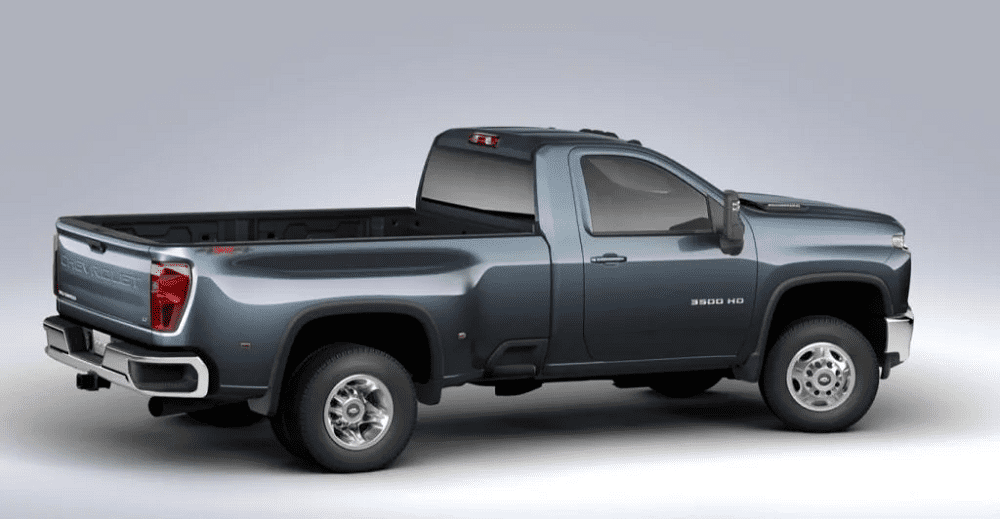
Regular cab pickups have no back seats. They carry 3 passengers max including the driver. They are shorter than the other trucks, but quite frankly, hardly sell at all any more. Regular cab sales account for only about 3% of truck sales now.
Extended Cab Trucks
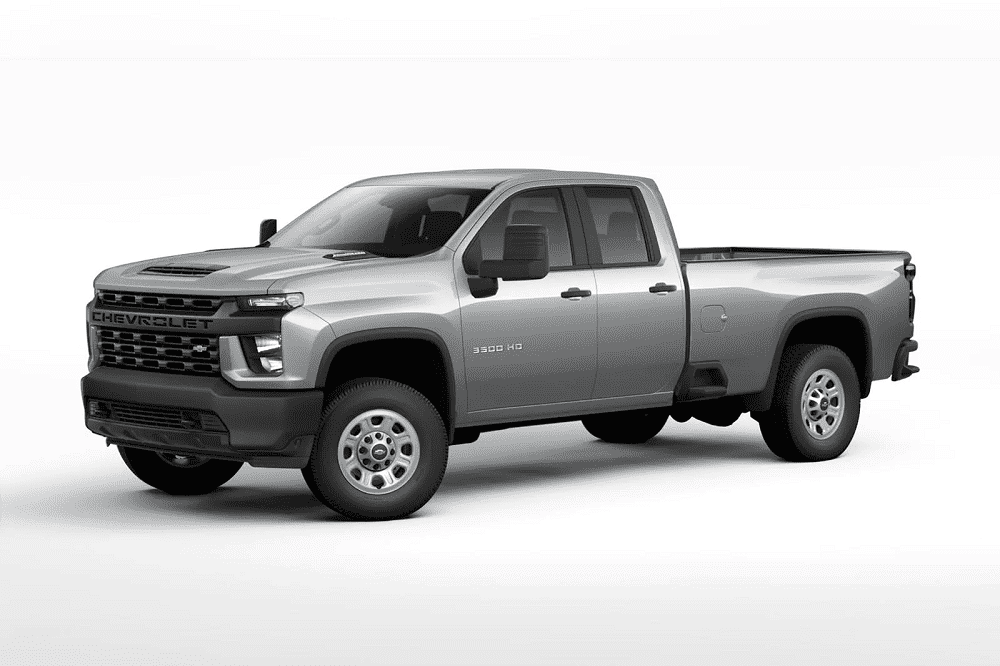
Extended cab trucks were the first “back seat” trucks that arrived on the scene. They have a less spacious rear seat (some fold down) and often times have small rear doors that open backwards to allow full access.
Extended cab trucks will seat passengers in the back, but for long hauls or regular use, they cab be a little cramped. These trucks are better suited for a couple who needs a bit more storage space inside the truck for hauling groceries, camping gear etc.
Crew Cab Trucks
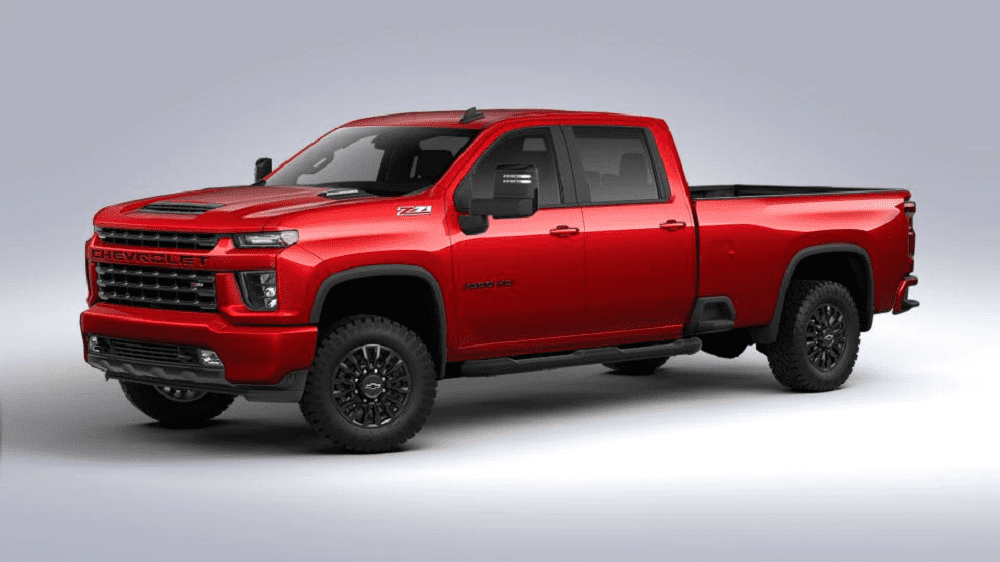
A crew cab truck has a much more spacious rear seat, and full sized doors. It is a 4-door vehicle. These trucks comfortably hold 6 passengers. 4 door pickups are by far the most popular trucks these days, accounting for about 85% of sales.
Considering Safety Features
When looking for a towing vehicle, there are many safety features that you may want to consider. Many of them are standard with newer trucks, but if you are shopping used trucks, just keep these in mind as they may have a weight in your decision.
Stability Control/ Braking Assistance
If you have ever towed a heavy trailer through hilly or mountainous country, you know that is is all about braking. Downhill runs are WAY more scary and demanding that hauling uphill. Many trucks will include a stability control system, which will allow an onboard computer to help apply pressure to wheels that need it. This control helps minimize understeer or oversteer and can certainly save your life.
Trailer Brake Controller
Any modern towing pickup trucks will have a trailer brake controller installed. These apply braking pressure to the trailer when you depress the brake pedal in the truck. They are adjustable so that you can match the brake pressure of the trailer to the truck.
Some older trucks will not have this feature, but it is something that you can get installed in the after market.
Tire Pressure Monitoring System
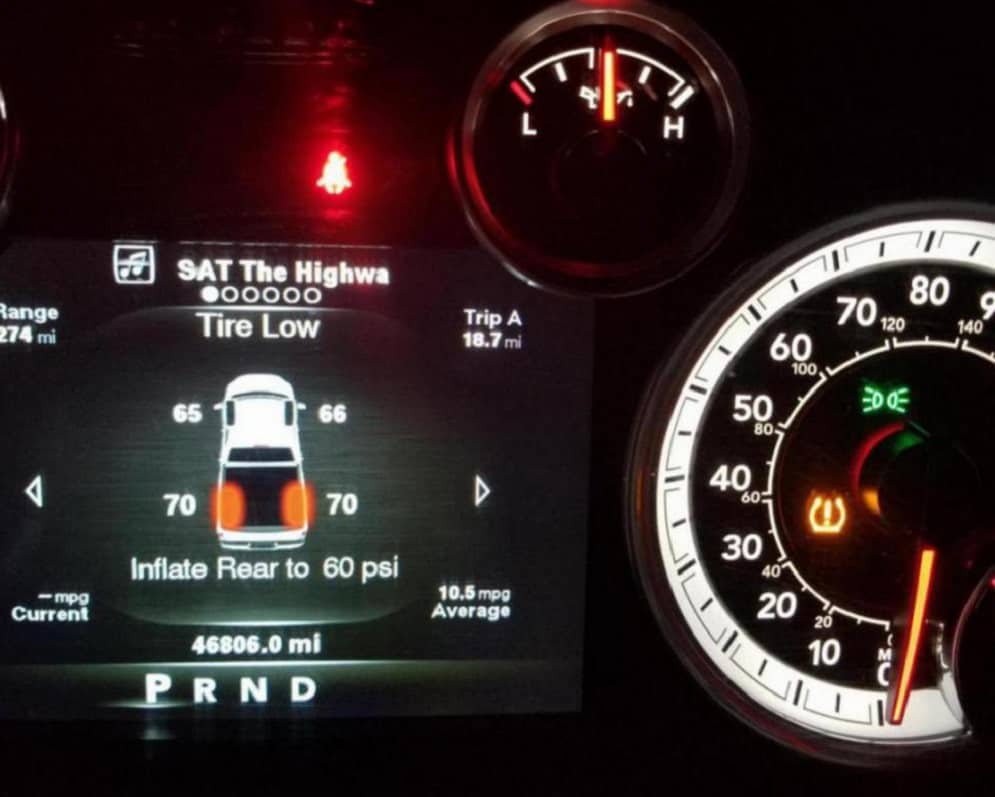
Like brake controllers, a TPSM will ususally come stock with newer trucks. It is SUCH a great system to have on both your truck AND your trailer. Tire pressure is one of the most important things to keep track of when hauling heay loads and a warning system for low pressure will save you TONS in blowout costs, and may very well save the lives of you and your loved ones.
Adaptive Cruise Control
Adaptive cruise control is a newer technology that is not standard, but is available on most truck models. It allows you to use your cruise control, but will adjust your speed if you drive up behind another vehicle. The system will maintain a safe distance until the coast is clear, then speed up to your desired speed once again.
Toyota has made it a standard on every trim, and hopefully all of the heavier duty truck manufacturers will follow suit soon. If you are buying new, ask about this super cool option.
Best Truck For Towing 5th Wheel
So, what is the best truck for towing a fifth wheel? When buying a truck, there are many good options. Each year, the 3 US truck manufacturers battle to gain supremacy of the truck market. Towing capacity and payload are 2 of the biggest factors that they want to maximize. Here are the top 3 heavy weight trucks for towing your rig.
1) Dodge Ram 3500
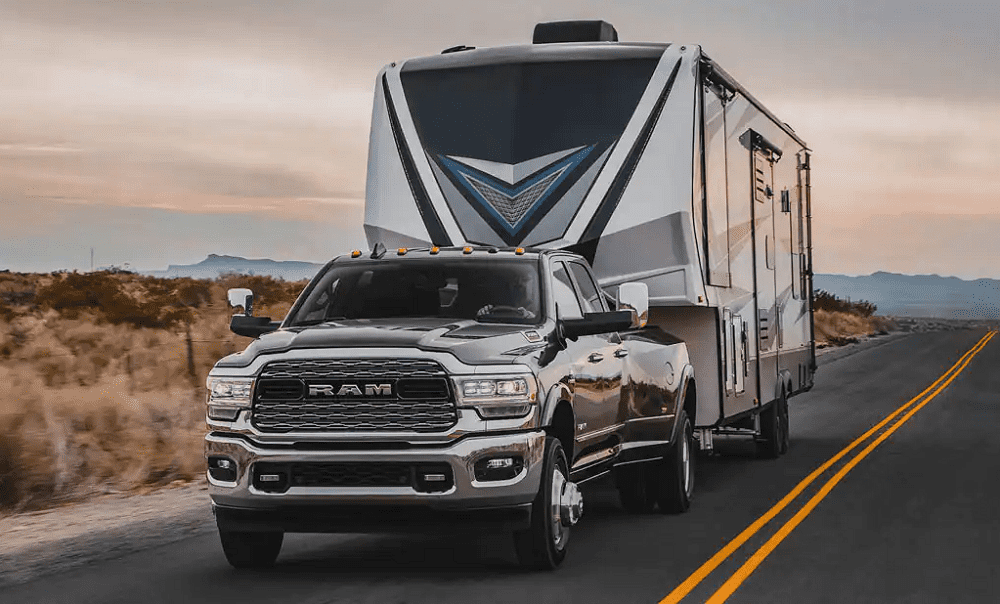
For sheer ability to haul lots of poundage and large things, Dodge is the undisputed leader. Ram trucks continually push the envelope as far as towing and payload. The 3500 series Ram trucks always answer the call with todays larger heavier 5th wheels.
The Cummins diesel powerplant has become a very well respected part of the pickup landscape.
2) Chevy Silverado/Sierra 3500HD
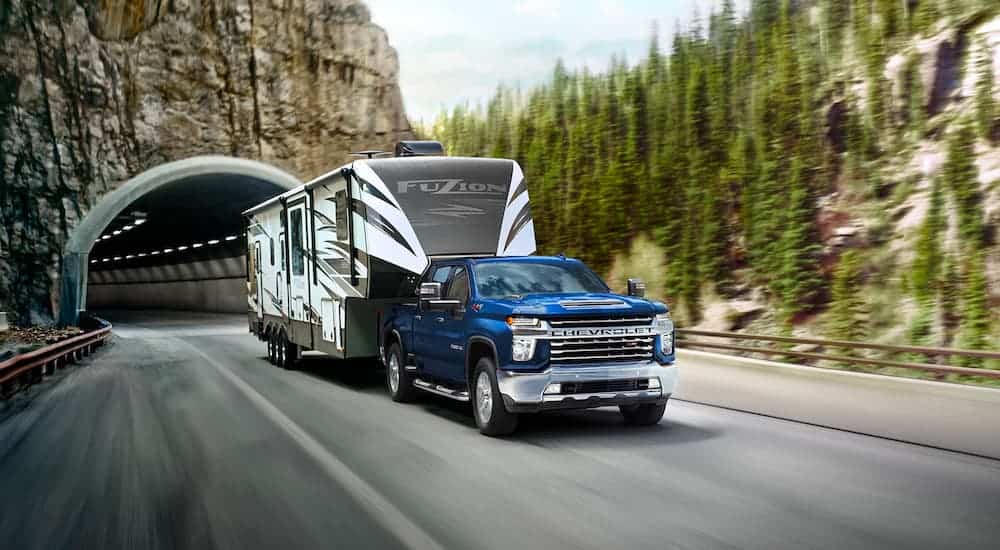
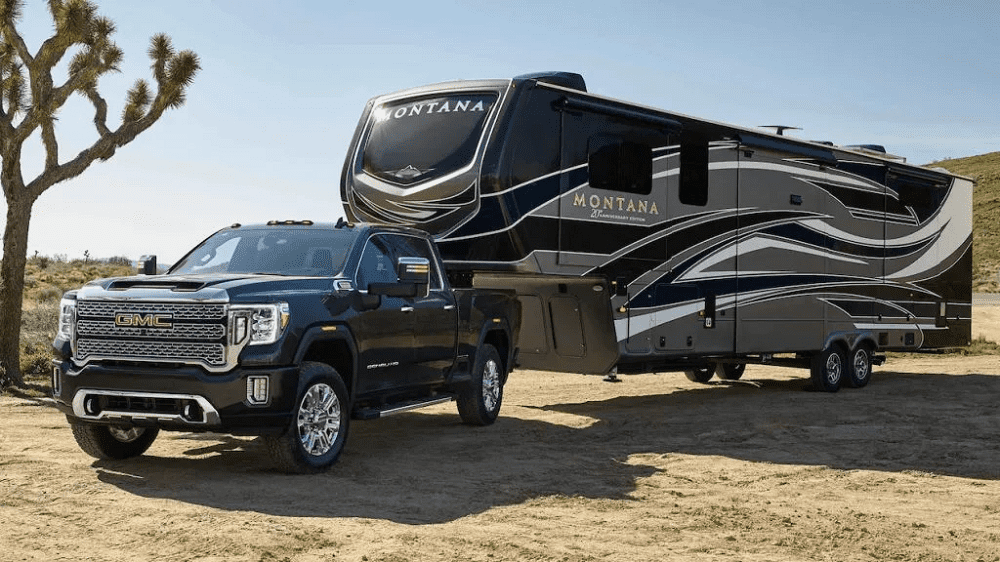
Chevy makes really nice trucks. With the Silverado line as well as the higher end GMC Sierra line, there is something for everybody. While GM lagged a bit in towing and payload during the mid teens, they have certainly caught back up in the last few years.
The Duramax diesel combined with the Allison transmission is a favorite powerplant among truck enthusiasts.
3) Ford F-350
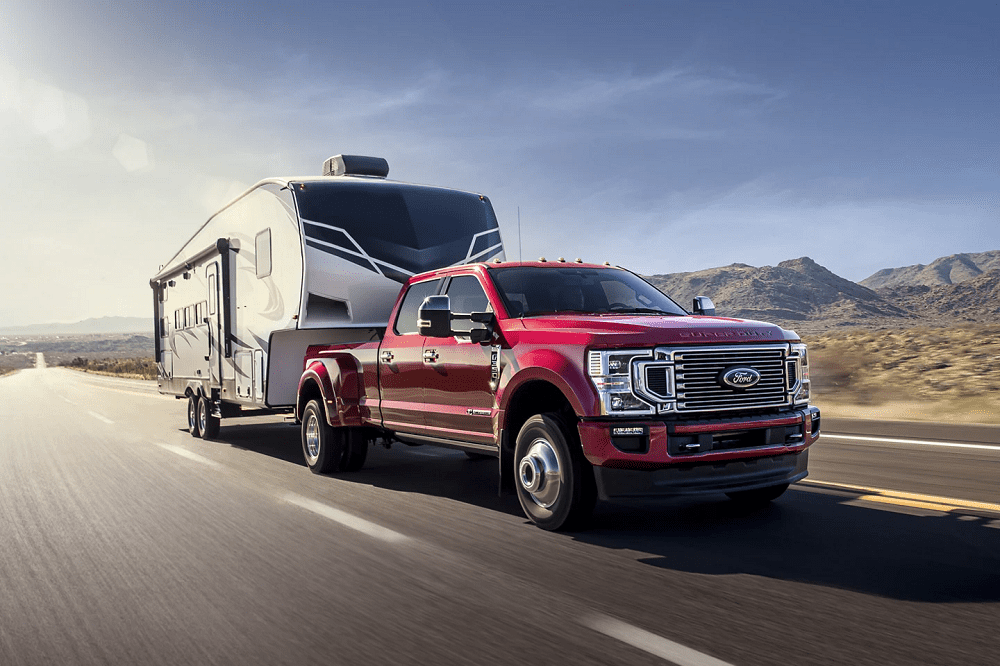
Ford trucks are the best selling pickups of all time (although the Chevy/GMC trucks are counted separately and sell more units combined.) They offer absolutely TONS of configurations to answer the needs of any perspective buyer. Their popular half ton trucks offer good value for quality.
Fords Powerstroke engine delivers tons of power and has been a Ford fan favorite for years.
(1) Etrailer, https://www.etrailer.com/faq-fifth-wheel-truck.aspx
(2) Cameron Rogers, https://www.edmunds.com/truck/articles/best-trucks-for-towing/

Frank Foley
Frank is the Head Hubby, Daddy, and Fix-It Guy of the Roving Foleys clan. He ia an avid traveler and has spent over 5 years traveling full time with his family. he loves helping others learn about the RV life. He has also traveled in Europe, Asia, and Australia with his wife Grainne.

Interesting article. A couple of things I noticed though. You suggested that has and diesel engines burn gas. Diesel engines require diesel fuel. You stated that you needed to add an additional leaf spring to your rear axle and needed to change to a higher load range director the additional weight of your 5th wheel trailer, that does not change the weight capacity of the axle.
Hey Dick, not sure how I suggested that both trucks would burn gas. They definitely do not. Yes, my axle was fine for the task, just needed more suspension and heavier tires.
Anyone who has towed can immediately speak to the benefits of a dually. The extra set of rear tires allows the load to feel more stable and handle crosswinds much better than a single rear-wheel setup.